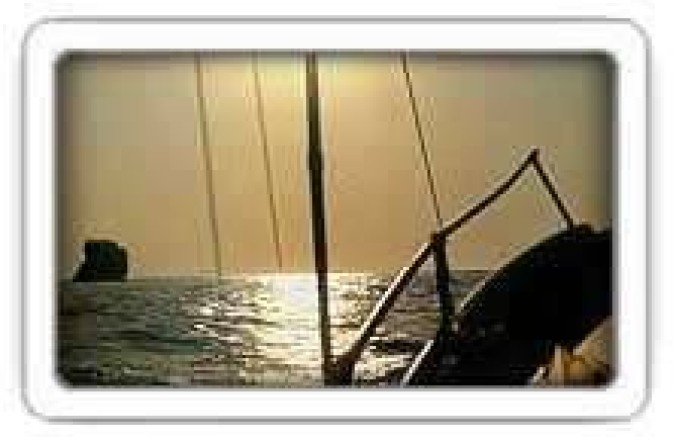Captain Thanassis's caique
From an article in Odyssey Magazine, Vol 2 No 5 May/Jun 1995
entitled, Aphrodite's Children on Kythira
By George Zarkadakis
the last section of which is:
"The Origins of Seduction
In the evening we found ourselves in a taverna in Logothetianika, listening to Gabrilis and Nontas (thirtysomethings who enjoy island-wide fame) playing the rembetika, while Australian-born children danced around us together with their Greek-born cousins. Gabrilis, on the guitar, is a doctor working at the local hospital, though it's hard to deduce this from his rock-star looks. Nontas, the bouzouki player, is a painter. They both came to Kythira from Australia, loved it, and decided to stay. Like Metaxia, they had discovered here a world that suited them best, a place of human proportions. They didn't want to be anywhere else. Their resolution frightened me. Could it be that Kythira was the original home of the Odyssean Lotophagoi, where one taste of its fruit was enough to ensnare the unsuspecting sailor forever within its confines?
It took me days to arrive at a possible answer. It was on the caique of Captain Thanassis. We were fishing in the deep waters around Antikythira, an island halfway between Kythira and Crete with just over 100 inhabitants. Thanassis's uncle Babis was at the helm, carefully steering the wooden vessel, as it slowly encircled a volcanic rock that emerged from the water like the petrified head of a sea monster. Captain Thanassis was born in Avlemonas, where he now lives with his family. He and his two brothers are professional fisherman. He is a tall and imposing man of 35 and his absolute mastery of his trade shows in his every move.
"These are very good waters," he tells me. "Only in the last few years has intensive fishing begun to take its toll. We have boats coming here from Kalamata, Crete-even Arabs and Italians. They don't care about next year. They go for the biggest catch. They kill sea turtles for fun." He stops and feels the long plastic thread, the petonia. He gives it to uncle Babis to feel it too. "Ah, he got away!," the uncle says in disappointment and goes back to the helm.
"Some creatures have to live," Captain Thanassis muses. "Life is precious in every form and everything plays its role-tortoises, dolphins, even that Mediterannean monk seal that comes and destroys our nets every now and then. She has to eat too. If you don't respect it, if you don't protect it, then sooner or later it will take its revenge on you."
I ask him about his life in Kythira, about what made him want to stay and make a living here. "I can't stand big cities," he says. "I do not understand how people can actually tolerate life there. But life in Kythira isn't easy either. You should be here in the winter to really see what I mean. We don't even have a gynecologist on the island, so I have to take my pregnant wife to Athens every time she needs something. Successive governments have promised much but have done nothing to dissuade people from abandoning the countryside. If one could give incentives so that Kythira could be developed touristically, then new jobs will be created and the island will flourish again."
Captain Thanassis had made his choice despite the hardship he has to face, as had Metaxia, Gabrilis, Nontas, and Nikos. For them, like many others-including the thousands who remain in the "Big Kythira" of the far away Antipodes-Cerigo wields an unyielding grip on their hearts. But why?
As we made our way back to Avlemonas the sun began to slowly set. The sea became like a velvet gown that rippled around us, softly caressing the fearless boat of Captain Thanassis. As we approached the old port of Avlemonas-where back in 1802 the ship "Mentor" was wrecked as it carried, under order of Lord Elgin, the Parthenon marbles-we were all silent, our minds empty. To our left, the view of the beach of Paleopolis arrested our imagination, taking on mythic proportions with the golden sunset shimmering on shore and sea.
And then it struck me. How could I have forgotten? It was here that, according to mythology, the goddess of love, Aphrodite, was born of the froth. She came upon that very shore, carried there on a shell, changing the life of mortals forever after. Kytherians, like all of humanity, were her children, born of the same froth.
Who could ever resist the love goddess's own birthplace? As we reached the shore, the air was filled with the bittersweet aroma of honey and seawater, and Aposperites, the evening star, twinkled its eye and took its place onto the purple dome of the glorious night sky".
To read the entire article go to History, subsection, General History, or search Zarkadakis, or Thanassis's, with the internal search engine.
Author:Odyssey Magazine
When Published: bi-monthly
Publisher: Odyssey Magazine
Available: (See, below).
Description:
Odyssey magazine is a brilliant magazine, originating in Greece, which chronicles people, places and events of the Greek Diaspora.
Greece:
Odyssey
Zephyr Publications S.A
Aetideon 13, Holargos 155 61
Athens
Greece
USA:
Odyssey Magazine
PO Box 3000
Denville
NJ 07834-9347
USA
Australia:
Odyssey Magazine
P.O. Box 187
Newtown
NSW 2042
Australia
Canada:
Odyssey Magazine
50 McIntosh Drive, Suite 242
Markham, Ontario
L3R 9T3 Canada
email subscriptions:
subscribe@odyssey.gr
Web Address:
http://www.odyssey.gr
